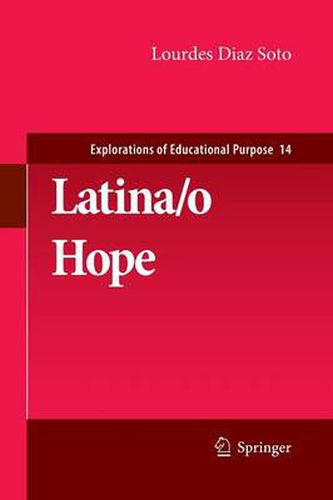Readings Newsletter
Become a Readings Member to make your shopping experience even easier.
Sign in or sign up for free!
You’re not far away from qualifying for FREE standard shipping within Australia
You’ve qualified for FREE standard shipping within Australia
The cart is loading…






This title is printed to order. This book may have been self-published. If so, we cannot guarantee the quality of the content. In the main most books will have gone through the editing process however some may not. We therefore suggest that you be aware of this before ordering this book. If in doubt check either the author or publisher’s details as we are unable to accept any returns unless they are faulty. Please contact us if you have any questions.
There are an estimated forty-eight million Latinas/os living in the United States, roughly sixteen percent of the population. Not only are they the largest minority group in the country but also the youngest: one out of five children is Latina/o. The rise in the Latina/o population has caused for panic in some areas of the country, resulting in hostile and sometimes violent racism and xenophobia, and yet, much of that hatred is fueled not on facts but rather on myths about immigration.
To date, most studies on immigration have been data driven, focusing on migrating groups or policy analyses. Latina/o Hope is different. It incorporates salient theories on migration as it moves toward a new theorizing, one that views immigration from the immigrant’s perspective. Thus, it integrates research into the depiction of various slices of immigrant experience-the young women disappearing in the city of Juarez, the various students at various stages of their educational journeys, the young children in need of ESL programs, the ethnically-mixed immigrants, the undocumented workers, and others.
Latina/o Hope discusses the impact of neoliberal policies and global capitalization on the daily lives of Latina/o immigrants, serving as an inspiration for dialogue, praxis and imagination to love and serve one another.
$9.00 standard shipping within Australia
FREE standard shipping within Australia for orders over $100.00
Express & International shipping calculated at checkout
Stock availability can be subject to change without notice. We recommend calling the shop or contacting our online team to check availability of low stock items. Please see our Shopping Online page for more details.
This title is printed to order. This book may have been self-published. If so, we cannot guarantee the quality of the content. In the main most books will have gone through the editing process however some may not. We therefore suggest that you be aware of this before ordering this book. If in doubt check either the author or publisher’s details as we are unable to accept any returns unless they are faulty. Please contact us if you have any questions.
There are an estimated forty-eight million Latinas/os living in the United States, roughly sixteen percent of the population. Not only are they the largest minority group in the country but also the youngest: one out of five children is Latina/o. The rise in the Latina/o population has caused for panic in some areas of the country, resulting in hostile and sometimes violent racism and xenophobia, and yet, much of that hatred is fueled not on facts but rather on myths about immigration.
To date, most studies on immigration have been data driven, focusing on migrating groups or policy analyses. Latina/o Hope is different. It incorporates salient theories on migration as it moves toward a new theorizing, one that views immigration from the immigrant’s perspective. Thus, it integrates research into the depiction of various slices of immigrant experience-the young women disappearing in the city of Juarez, the various students at various stages of their educational journeys, the young children in need of ESL programs, the ethnically-mixed immigrants, the undocumented workers, and others.
Latina/o Hope discusses the impact of neoliberal policies and global capitalization on the daily lives of Latina/o immigrants, serving as an inspiration for dialogue, praxis and imagination to love and serve one another.